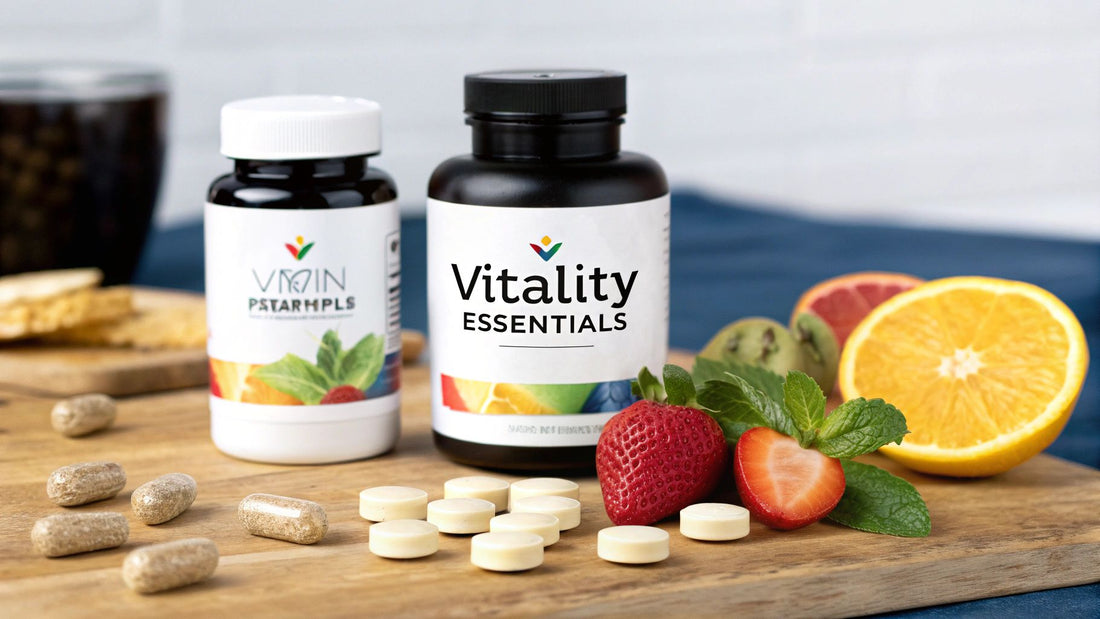
Best Supplements for Women Over 30 for Vitality
Share
For many women over 30, the non-negotiables are Vitamin D for strong bones, Magnesium for everything from muscle function to relaxation, and Omega-3s to keep your brain sharp and joints happy. These are the foundational players that tackle the most common shifts your body goes through in this decade, helping you stay on top of your energy, hormones, and overall well-being.
Why Your Nutritional Needs Shift After 30
Welcome to your thirties. It’s a decade of big changes—personally and physically. As your body evolves, what it needs from you evolves, too. This is where smart supplementation stops being confusing and starts being essential. Think of this guide as your roadmap, not a random trip down the vitamin aisle.
This is the decade when things start to feel... different. Your metabolism might not be the furnace it once was, your hormonal rhythms can get a little unpredictable, and your body’s ability to maintain bone density changes. This is all completely normal, but it means you need to get more strategic with your nutrition to feel your best.
The infographic below breaks down the three biggest physiological shifts that start happening after you hit 30.
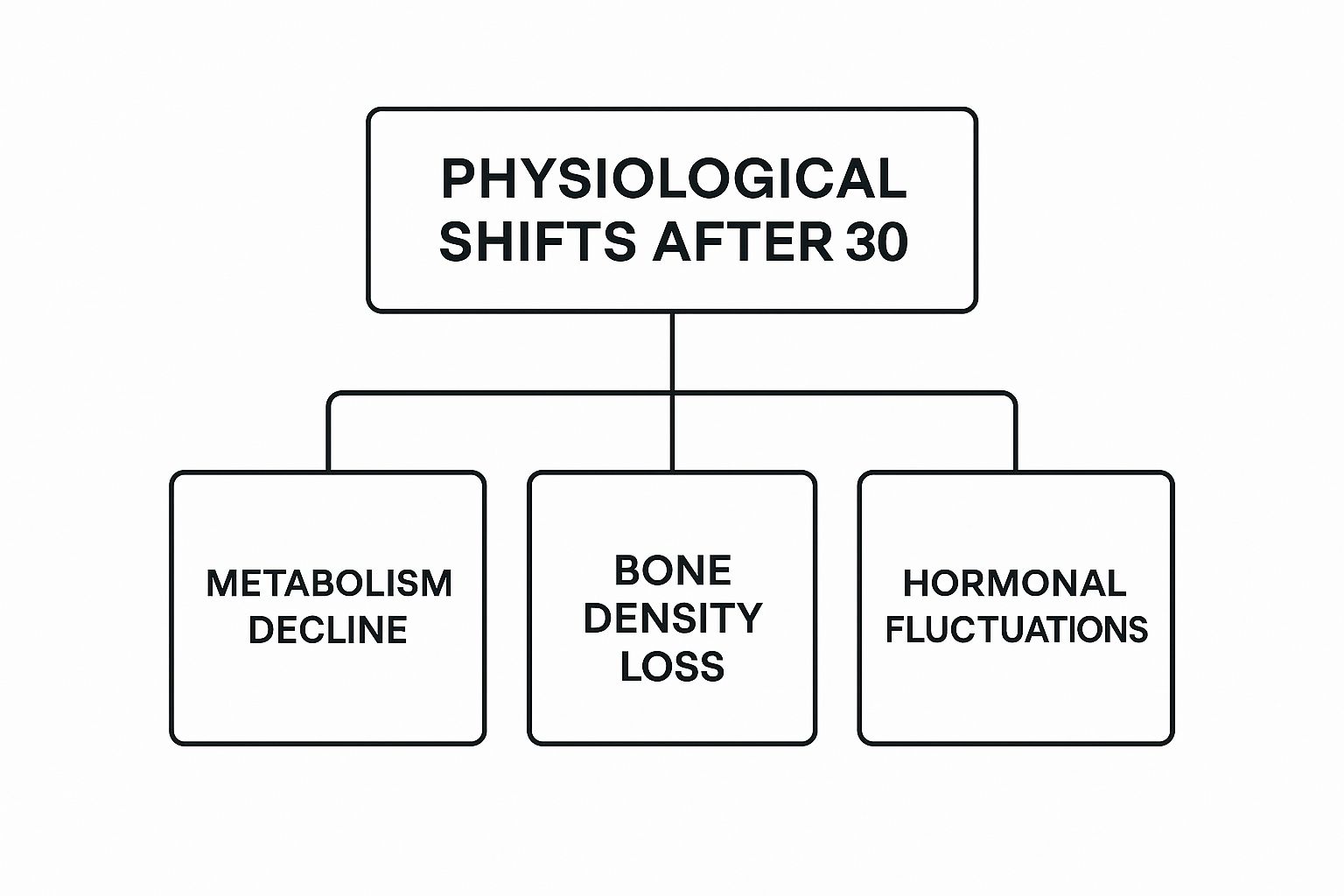
As you can see, a slower metabolism, a gradual loss of bone density, and fluctuating hormones are the key areas that need a little extra support. This is exactly why targeted nutrition becomes so important.
The Growing Focus on Women's Wellness
If you’re starting to think more about your long-term health, you’re not alone. More and more women are taking proactive control of their well-being, and the market is reflecting that shift.
This isn't just a trend; it's a movement. The explosion in the women's supplement market shows a collective shift toward preventative care and feeling your absolute best, not just "fine."
The numbers back it up. The global market for women's health and beauty supplements hit USD 57.42 billion in 2024 and is expected to climb to USD 77.46 billion by 2030. And guess who the biggest consumer segment is? Women aged 31-50. This isn't a coincidence—it's the life stage where support matters most. You can explore more data on the women's supplement market to see just how massive this movement is.
Our goal here is simple: to help you understand what your body is actually asking for and how to choose high-quality supplements that deliver. We'll start by digging into the most impactful options for women over 30.
The Foundational Supplements for Women Over 30
Think of your supplement routine like building a house. You wouldn’t hang pictures on the walls before you have a solid foundation, right? These "Core Four" supplements are those non-negotiable pillars. They support your overall wellness after 30 by addressing the most common nutritional gaps and hormonal shifts that happen as we get older.
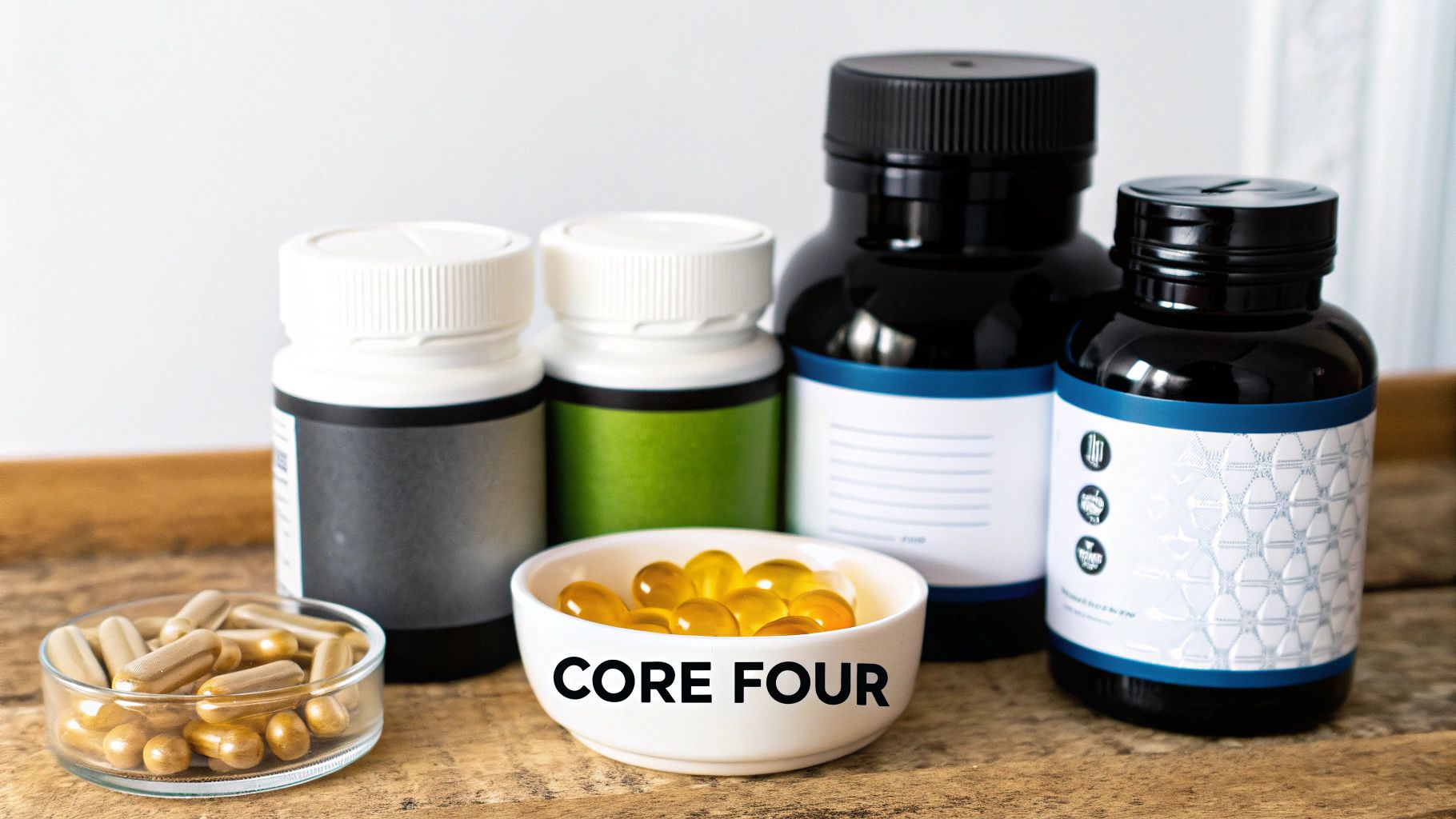
Let’s get straight to what these do for you and why they’re so critical.
Vitamin D: The Sunshine Vitamin
When you hear Vitamin D, you probably think bone health. And you’re not wrong—it’s absolutely essential for helping your body absorb the calcium that keeps your skeleton strong. But it does so much more. Think of it as a master regulator for your immune system, mood, and hormones.
As we move past 30, our skin actually becomes less efficient at making Vitamin D from sunlight. That’s why adding a supplement is such a smart move for most women.
Magnesium: The Master Conductor
Magnesium is the unsung hero of your body, quietly running the show behind the scenes. It’s like the master conductor for an orchestra of over 300 different biochemical reactions. This one mineral helps manage everything from how your muscles and nerves fire to your blood sugar and blood pressure levels.
If you’re dealing with muscle cramps, restless nights, or just feel constantly stressed, low magnesium could be the culprit. It has a natural calming effect on the nervous system, helping you unwind and recover so you can wake up feeling refreshed.
Omega-3 Fatty Acids: Brain and Body Maintenance
Think of Omega-3s as the high-quality oil for your body’s most important machinery. These healthy fats are absolutely critical for your brain, supporting memory, focus, and overall cognitive sharpness. They’re also powerful inflammation fighters, which is a massive win for your joints and heart health.
The tricky part is that your body can’t make these on its own—you have to get them through food or a good supplement. While fish oil is the classic go-to, high-quality, plant-based algae oil is another fantastic option.
A High-Quality Multivitamin: Your Nutritional Insurance
Let's be real—even if you eat clean, it’s almost impossible to get every single nutrient you need, every single day. Life gets in the way. A high-quality multivitamin acts as your daily nutritional insurance policy, filling in the gaps so your body always has the raw materials it needs to function at its best.
A well-formulated multivitamin doesn't just throw a random assortment of nutrients together. It provides a strategic blend of vitamins and minerals in their most bioavailable forms to support energy, immunity, and overall vitality.
Look for formulas specifically designed for women, as they often contain targeted levels of iron, folate, and B vitamins. And if you’re active, pairing this solid nutritional base with performance-focused supplements can make a huge difference. Many women wonder, can women take creatine? The answer is a huge yes—it’s amazing for helping build lean muscle and strength.
The Core Four Supplements at a Glance
To make it even easier, here’s a quick-reference table that breaks down these foundational four. Think of this as your cheat sheet for building a better supplement routine.
| Supplement | Primary Benefits | Rich Food Sources | Typical Daily Dosage |
|---|---|---|---|
| Vitamin D | Bone health, immune function, mood regulation | Fatty fish, fortified milk, sunlight | 1,000–2,000 IU |
| Magnesium | Stress reduction, muscle relaxation, sleep support | Leafy greens, nuts, seeds, dark chocolate | 200–400 mg |
| Omega-3s | Brain health, anti-inflammatory, joint support | Salmon, walnuts, chia seeds, flaxseeds | 500–1,000 mg (EPA/DHA) |
| Multivitamin | Fills nutritional gaps, supports energy production | Varies by nutrient | One serving daily |
With these four pillars in place, you’ve built a solid foundation for health that you can then build upon with more targeted supplements to meet your unique goals.
Targeted Support for Common Health Concerns
Once you've got your foundation set, you can start bringing in the specialists. Think of these supplements as targeted tools for the unique challenges that pop up after 30—like hormonal shifts, bone density, and that nagging daily fatigue.
Instead of just rattling off a list of nutrients, let's connect them to the real-world problems you're actually dealing with.
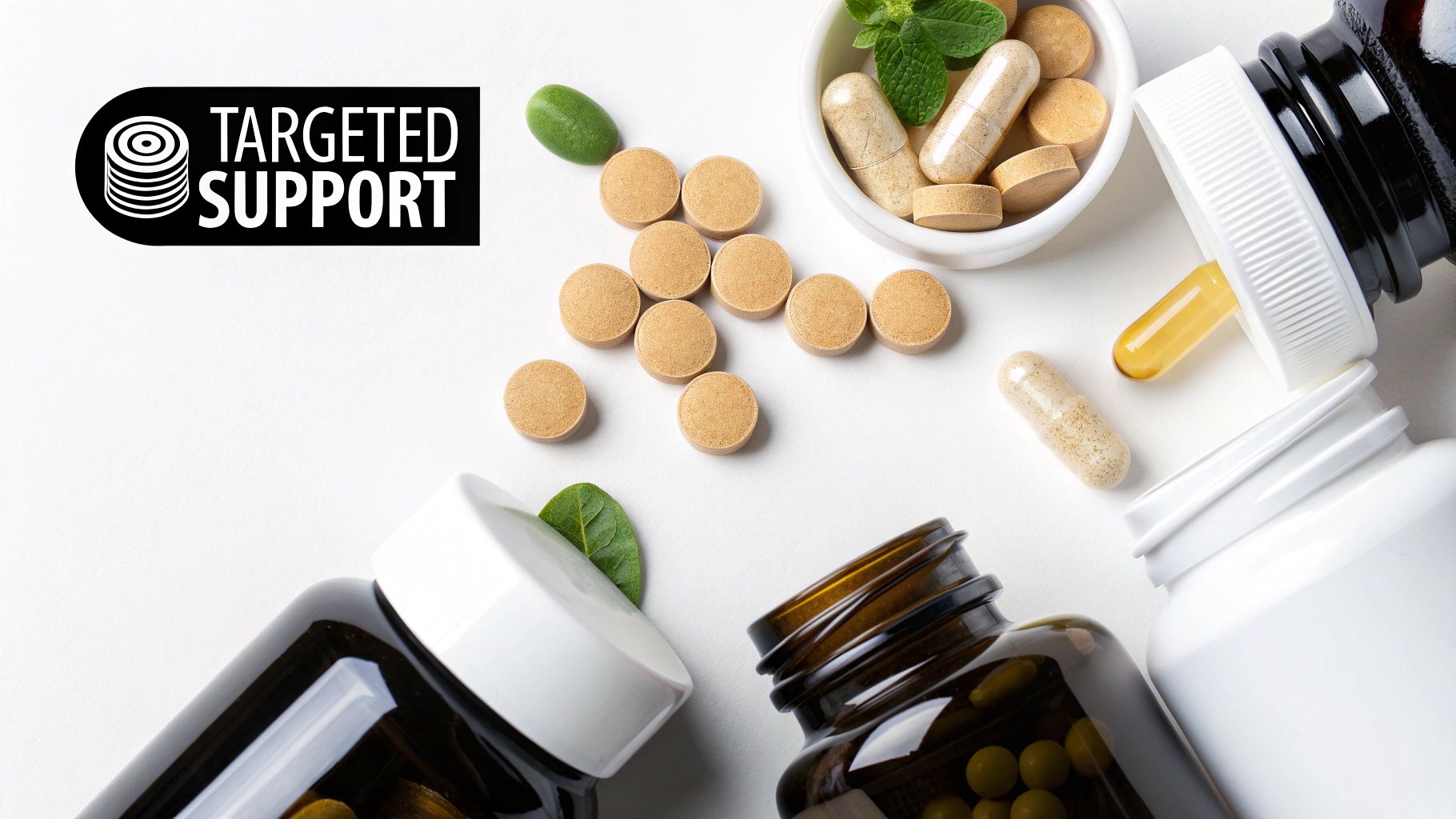
This way, you're building a supplement routine that doesn’t just cover the basics. You're actively solving problems, helping you feel stronger and more resilient day in and day out.
Build Your Bone Bank with Calcium
Think of your bones as a bank account. In your 20s, you made regular "deposits" of calcium, building up a solid reserve. The problem is, after 30, withdrawals can start happening faster than deposits. This is why actively protecting your bone density becomes non-negotiable if you want to avoid issues like osteoporosis down the road.
Vitamin D is crucial for helping your body absorb calcium, but you still need to get enough of the mineral itself. For women over 30, aiming for 1,000 mg per day from a mix of diet and supplements is the goal.
Your thirties are the prime time to fortify your "bone bank." A consistent intake of calcium and Vitamin D now is one of the most effective strategies for ensuring skeletal strength and mobility for decades to come.
Combat Fatigue with Iron
Constantly feeling drained, especially around your period? Iron deficiency is a super common reason for fatigue in women, particularly if you have heavy cycles. Iron is a core part of hemoglobin, which is the protein in red blood cells that carries oxygen everywhere in your body.
When your iron is low, your cells aren't getting the oxygen they need to create energy. The result? You feel sluggish, weak, and completely wiped out. A simple blood test can tell you if your levels are low, and adding an iron supplement can make a massive difference in getting your energy back.
Boost Energy and Mood with B-Vitamins and Probiotics
If your energy is lagging or your mood feels off-kilter, the answer might be in your gut and your cells. B-Vitamins are like the spark plugs for your body's engine, helping to turn the food you eat into fuel you can actually use.
At the same time, probiotics support your gut microbiome—that whole ecosystem of bacteria in your digestive tract. A healthy gut is directly tied to a stronger immune system, a better mood, and even sharper thinking. If you're feeling foggy and unfocused, a quality probiotic is a great place to start. Many women run into these issues during major life changes, and you can learn more about the best supplements for postpartum recovery for similar insights.
For women over 30, things like perimenopause and bone health suddenly become front and center, making targeted supplements a smart strategy. In fact, using multiple supplements is common during these transitional phases to manage the body's changing needs. You can read the full research on supplement trends among women to see just how common this is.
How to Choose Quality Supplements and Avoid Pitfalls
Walking into the supplement aisle can feel like stepping into a jungle. Countless bottles, flashy labels, and bold claims—how do you know what’s legit and what’s just cleverly marketed junk?
The secret is learning to read a supplement label like a pro. Think of it as a recipe: you need to know exactly what’s inside, how much of it, and whether there are any cheap fillers watering it down.
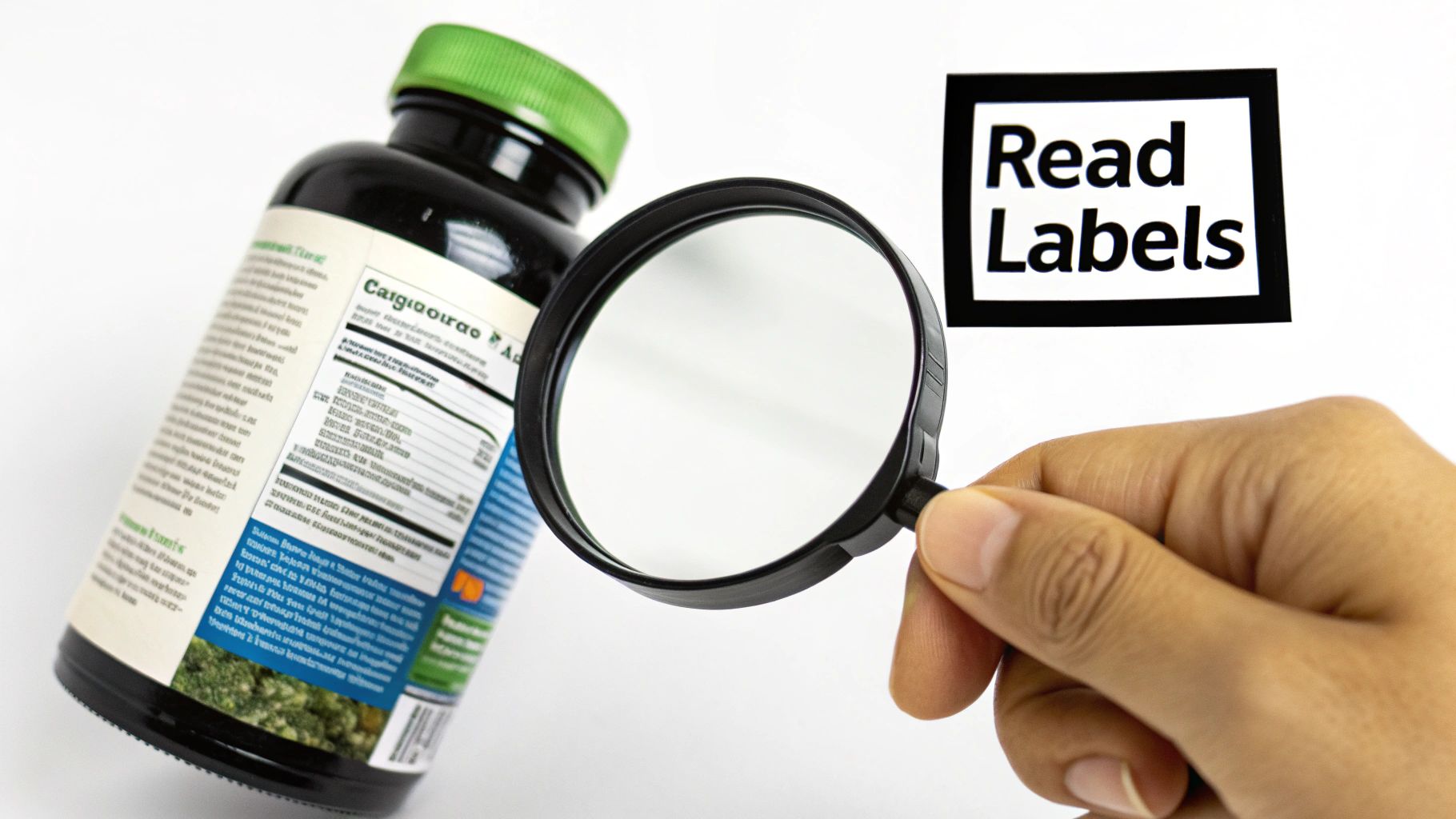
The best supplements for women over 30 will always have clear, transparent labeling. No hiding, no tricks.
Decoding the Supplement Facts Panel
Your first stop should always be the Supplement Facts panel. This is where the real story is told. A quality product will clearly list every single active ingredient and its exact dosage. This is non-negotiable—you need to know you’re getting an effective amount of each nutrient.
The biggest red flag you’ll ever see? The term "proprietary blend." It sounds exclusive and scientific, but it’s really just a marketing gimmick that allows companies to hide how much of each ingredient is actually in the product. They might list a dozen great-sounding nutrients, but you have no clue if you’re getting a clinical dose or just a tiny, ineffective sprinkle.
Always choose supplements that tell you exactly what you’re putting in your body. If a brand hides behind proprietary blends, it’s a good sign they might be hiding something—like low-quality ingredients or useless dosages.
Next, give the "Other Ingredients" list a quick scan. This is where you'll find fillers, binders, and other additives. Be on the lookout for things like magnesium stearate, titanium dioxide, and artificial colors or sweeteners. While some are needed to make the supplement, a long list of synthetic junk is a dead giveaway of a lower-quality product.
The Importance of Third-Party Certifications
The supplement industry isn't as tightly regulated as you might think. That's where third-party certifications come in—they’re your best friend for quality control. These independent groups test products to make sure what's on the label is actually in the bottle, and that it's free from contaminants.
To help you cut through the noise, here's a quick guide to the seals that actually matter.
Decoding Supplement Quality Seals
| Certification Seal | What It Guarantees | Why It Matters |
|---|---|---|
| NSF Certified for Sport | The product contains exactly what the label claims, has been tested for harmful contaminants, and is free of 270+ substances banned by major athletic organizations. | This is the gold standard for purity and safety, especially for athletes or anyone who wants total confidence in their supplements. |
| USP (U.S. Pharmacopeia) | The supplement's identity, potency, purity, and performance have been verified. It also means the product was made following FDA Good Manufacturing Practices (GMP). | This seal ensures you're getting a product that meets high standards for quality and consistency. It’s a huge mark of trust. |
| Informed-Choice | Every single batch of the product is tested for banned substances before it’s released to the market, ensuring it's clean and safe. | It provides an extra layer of assurance that you’re not consuming anything you shouldn't be. |
Looking for these seals gives you peace of mind that you’re putting your money toward something that's not only effective but also safe. It’s just as crucial as picking the right fuel for your body before a workout. Speaking of which, if you need an energy boost, you can check out our guide to the best pre-workout supplements for women beginners to find options that meet these quality standards.
Building Your Personalized Supplement Routine
A supplement routine should never be a one-size-fits-all deal. Think of it like a fitness plan—what works for your best friend might not be what your body actually needs. Your diet, lifestyle, and health goals are the real starting line.
Things like your activity level or what you eat can completely change your nutritional needs. For instance, a woman on a vegan diet needs to be way more intentional about B12 and iron, while a woman who trains hard might need extra magnesium to help with muscle recovery. Life stages also play a huge role, whether you’re planning a pregnancy or navigating the shifts of perimenopause.
This is why getting to know your own body is so important. As we get older, relying on supplements often becomes more common. While 63.8% of all women in the U.S. use supplements, that number jumps to an incredible 80.2% for women aged 60 and over. It's a clear trend toward taking wellness into your own hands. You can see more of the data on these supplement trends at cdc.gov.
Creating Your Smart Supplement Strategy
The goal is to build a plan that truly supports you, not just to follow generic advice. The easiest place to start? Making sure your body is actually absorbing what you take.
- Pair Fat-Soluble Vitamins with Food: Vitamins A, D, E, and K need fat to be absorbed properly. Taking them with a meal that has healthy fats—think avocado, nuts, or olive oil—ensures you get the full benefit.
- Don't Overload All at Once: Spreading your supplements out during the day is easier on your stomach and helps with absorption. For example, iron and calcium compete, so it’s best to take them at different times.
- Listen to Your Body: Pay attention to how you feel. More energy, sleeping better, or clearer skin are all good signs. But if you’re dealing with digestive issues or other new symptoms, it might be time to adjust.
The most powerful tool you have for personalizing your routine is professional guidance. A supplement plan is only as good as the information it’s built on, and nothing beats objective data from your own body.
Partnering with Your Healthcare Provider
Before you start anything new, especially if you have existing health conditions or take medication, it is critical to talk to your doctor or a registered dietitian. They can cut through the noise and help you avoid any risky interactions.
Show up to your appointment ready to get the most out of it. Here are a few questions to ask:
- Based on my recent bloodwork, are there any nutrients I’m low in?
- Do any of my current medications interact with common supplements like magnesium or iron?
- Are there specific blood tests you’d recommend to check my Vitamin D, B12, or iron levels?
A few simple blood tests can give you priceless, data-driven insights into your specific needs. It’s the best way to take the guesswork out of building a routine that actually works for you.
Your Questions, Answered
Let's be real—the supplement world is confusing. You start a new routine feeling hopeful, but a million little questions pop up. We get it. This is your no-fluff guide to the most common questions we hear from women just like you.
Our goal? To clear up the confusion so you can feel confident and in control of your health.
Can’t I Just Get Everything From Food?
This is the big one. In a perfect world, yes. A clean, whole-foods diet is always your foundation—nothing replaces that. But hitting your nutrient goals every single day just through food is a lot harder than it sounds.
Here's why most of us can't rely on diet alone:
- Our Soil Is Tired: Modern farming has left our soil seriously lacking in key minerals. That means the spinach you’re eating today just doesn't have the same nutritional punch it did for your grandmother.
- Life Is Demanding: Stress, tough workouts, and not enough sleep all burn through your nutrient stores way faster. Your body's demands go up, and it's tough for your diet to keep pace.
- Your Needs Change: Things like perimenopause or dietary choices (like being vegan) create a much higher need for specific nutrients that are incredibly hard to get enough of consistently.
Think of supplements as your nutritional insurance policy. They’re not a substitute for a healthy diet; they’re here to fill in the gaps that are almost impossible to avoid.
How Long Until I Actually Feel a Difference?
Patience is everything here. A supplement isn't like a shot of espresso that hits you instantly. It works by slowly and steadily rebuilding your body’s nutrient levels, and that takes time. How much time depends on the supplement and where you're starting from.
If you’re seriously low in iron, for example, you might feel your energy bounce back within a few weeks. But for things like collagen for smoother skin or Omega-3s for brain fog, you’re looking at 2-3 months of consistent use to see real, lasting changes.
The secret is consistency. Taking something here and there won't cut it. Your body needs that daily dose to build up enough of a reserve to make a difference. Make it a non-negotiable part of your day.
Try keeping a simple journal. Track your energy, sleep, mood, or whatever you’re trying to improve. It’ll help you spot the small wins along the way.
Is It Okay to Mix a Bunch of Supplements?
Yes, you can absolutely combine supplements, but you have to be smart about it. Many nutrients actually work better together—they’re a team. A classic example is Vitamin D and calcium; D is crucial for helping your body actually absorb the calcium.
But some supplements compete with each other. High doses of zinc can block copper absorption, and calcium gets in the way of iron. This is why just grabbing bottles off the shelf without a plan can backfire.
Before you start cocktailing your supplements, stick to these rules:
- Read the Labels: Your multivitamin might already have a solid dose of what you’re about to add. Check first to avoid accidentally overdoing it.
- Give Them Space: Take competing minerals like iron and calcium at different meals, hours apart.
- Talk to a Pro: When in doubt, run your routine by your doctor or a registered dietitian. They can give your lineup a quick safety check.
How Do I Know if This Stuff Is Even Working?
The only way to know for sure is to tie it to a specific goal. Taking magnesium for better sleep? After a month, are you actually sleeping through the night? Taking B-vitamins to beat the 3 PM slump? Check in with yourself—is that slump gone?
Beyond just feeling better, data is your best friend. A simple blood test from your doctor is undeniable proof. When you see your Vitamin D levels go from "deficient" to "optimal," you know what you're doing is working. It takes all the guesswork out of the equation.
At Bold Buns, we’re all about building strong, powerful bodies with science-backed formulas. We create clean supplements designed for women who are serious about getting results from their hard work. If you’re ready to sculpt your body and feel your strongest, check out what we’ve built for you.
Learn more at https://tryboldbuns.com
